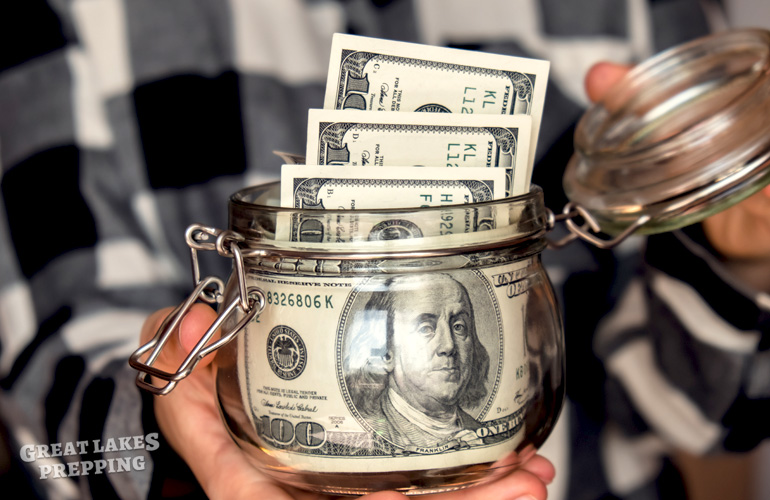Financial Preparedness During a Recession

Recessions are an unfortunate reality in the economic cycle, marked by a significant decline in economic activity, rising unemployment, and financial uncertainty. While individually we cannot control the occurrence of a recession, we can take proactive steps to protect our financial well-being and navigate the challenging times more effectively. Financial preparedness during a recession is crucial to minimize the impact we may personally experience. In this article, we discuss some strategies for weathering the storm and maintaining financial stability when facing an economic downturn.
Build an Emergency Fund
Having an emergency fund is one of the most critical aspects of financial preparedness. Aim to save at least three to six months’ worth of living expenses in a separate savings account. This fund acts as a safety net during a recession, helping cover essential expenses in case of job loss or reduced income. “Just save more money” is certainly easier said than done for most regular folks. But so often it’s a simple matter of prioritizing. Instead of buying yet another pocket knife or tactical flashlight, dump that hundred bucks into the emergency fund. There’s nothing fun or interesting about financial prepping…but there’s also nothing fun about missing a mortgage payment because your furnace broke in February.
Reduce Debt
Paying down high-interest debts, such as credit card debt and personal loans, should be a priority during stable economic periods. Lowering debt burdens can free up more funds to allocate towards savings and essential expenses during a recession.
As a middle-aged person, I find myself in conversations about investing more often than I could have ever imagined when I was younger. My friends and family around my age always talk about stock and crypto and any other financial investment that could provide a return of a few percentage points. In the meantime, most of those same friends and family have thousands of dollars in credit card debt. The average credit card interest rate in the United States is 22%. And here’s the thing: There is no conventional investment opportunity on this planet from which the average person is likely to see a 22% return (yes, there are exceptions…I could have invested in Google back when they were in their mom’s garage). My point is: Why the heck would you spend a bundle of cash to invest in something that might get you a 2-5% return after a few months or years while you still have a pile of high-interest debt?? Every dollar you pay off of that credit card balance is effectively bringing you an instant, immediate return in the form of “22% interest on a bundle of money you no longer have to pay from this moment forward!”
Diversify Income Sources
Relying solely on one source of income can leave individuals vulnerable during a recession. Consider diversifying your income streams by exploring side gigs, freelance work, or starting a small business. Or heck, go through everything you own and identify the absolute mountain of stuff you will never use again and sell it on eBay or Facebook Marketplace. In any case, multiple income sources provide a cushion against economic downturns, and anything you can do to add to your total monthly revenue is going to be key.
Review and Adjust Your Budget
Reevaluate your budget to identify areas where you can reduce discretionary spending. Trim unnecessary expenses and prioritize essential items to ensure you can cover your basic needs during a recession. Do you even remember off the top of your head how many streaming TV services you subscribe to at this very moment?? Between unused subscriptions and other expenses for things you won’t even miss, I bet you could scrape together at least $100 in monthly savings without even breaking a sweat.
Examine Your Investments
During a recession, investment markets may experience significant volatility. Review your investment portfolio and consider adjusting asset allocations to align with your risk tolerance and financial goals. Consult with a financial advisor to make informed decisions about your investments. Do you have a 401k through work? If you’re like me, it’s so easy to just never look at it (especially during a recession when it’s too painful to look at what your retirement balance has shrunk down to). But it’s important to understand your position, and figure out if there’s any adjustments you can make right now to help your long-term situation.
Assess Employment Security
If you are employed, assess the stability of your job and industry during economic uncertainty. Be prepared for potential job changes and consider acquiring new skills to remain relevant in the job market. Ten years ago, I was at the top of my game and the height of my career. But working in technology, I am already considered a dinosaur. At any moment I could find myself unemployed, and borderline-unemployable. That is, if I don’t take the time specifically to train and learn new things that are tangential to my current line of work. It’s not fun or easy to avoid becoming obsolete, but I’m not close enough to retirement to throw in the towel yet.
Review Insurance Coverage
Ensure that your insurance coverage, including health, life, and disability insurance, is sufficient to protect you and your family during a recession. Adequate coverage can prevent significant financial setbacks in case of unforeseen events. Additionally, periodically shop around for new homeowner’s and/or auto insurance. It’s so easy to just never think about it again. I get a policy set up with a company, and I just let it ride….for years. But every 8 or 10 years I get the inkling to get some new price quotes, and each time I am blown away by how much money I end up saving after switching to a new company. Year after year, little by little, my existing premiums go higher and higher. And since companies do not value loyalty anymore, the only way to see some significant savings is to jump ship. The last time I switched my auto and home policies to a new company, I immediately began spending approximately $140 less EVERY MONTH.
Avoid Panic Decisions and Stay Informed
During a recession, emotions can run high, leading to impulsive financial decisions. Avoid panic selling of investments or making significant changes to your financial plan without careful consideration and expert advice. Stay informed about economic developments and trends that may impact your financial situation. Seek guidance from financial experts or advisors who can provide tailored advice based on your specific circumstances.
Practice Frugality
Embrace frugal living habits during a recession to stretch your budget further. Cook at home, cut back on non-essential expenses, and explore cost-effective entertainment options. Do you really need those K-cups to drink good coffee? It’s great that you’re making it at home and not going to Starbucks every day, but still…those K-cups really add up. Have you ever used a French press? It tastes better than K-cup coffee, and makes 3x as much coffee in the same amount of time! A French press will never break for no reason, and it costs about 20 bucks. So maybe don’t replace that Keurig when it breaks in 2 months. Just sayin…
Network and Collaborate
Building a strong professional and social network can be beneficial during challenging economic times. Networking can open doors to potential job opportunities or collaborative ventures.
Financial preparedness is a journey and a habit, not a one-time activity. Regularly review and update your financial plan to adapt to changing circumstances. By implementing these strategies, you can better shield yourself from the adverse effects of a recession and position yourself for better financial security in the future (and more importantly, right now!)

